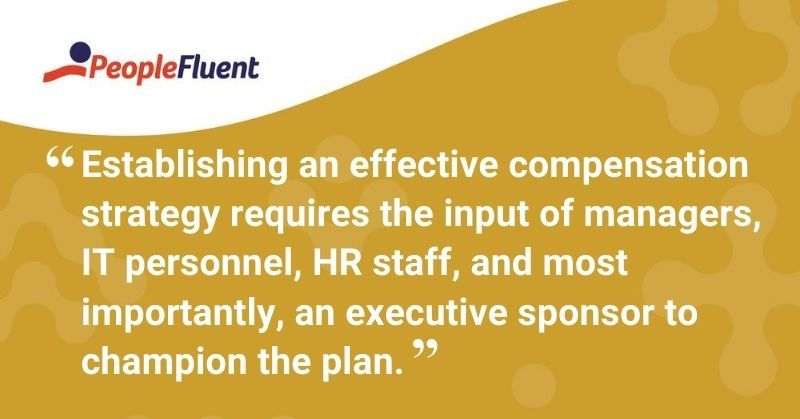Published: Sep 3, 2020Time to read: 4mins Category: Compensation
3 Benefits of Setting up a Compensation Team
Compensation management can be one of the most difficult and most important aspects of running a successful enterprise. Knowing which type of compensation package to offer new hires or when to give an existing employee a salary increase requires a heavy amount of market research and several other data elements. Because of the complex and subjective nature surrounding employee compensation, these decisions are best left to knowledgeable compensation professionals. Read on for a deeper dive into the benefits of setting up a compensation team.
Compensation is more than just salary—in theory, it’s an employer’s way of communicating value to its employees. But, it also includes bonuses, incentives and commissions, stock options and indirect compensation (like health and life insurance), worker’s compensation, and 401K matching. Developing the right mix of components is central to hiring, and keeping, the best employees.
Establishing an effective compensation strategy is not just a one-person job. It requires input from a cross section of disciplines including managers, IT personnel, HR staff, and most importantly, an executive sponsor to champion the plan. Along with this compensation team, you also need a compensation technology partner that understands your goals and can help you implement those goals with the most appropriate HR software solution for your organization.
By taking this team approach, there are three ways you can help improve your chances for success.

You might also like: 'The Top 4 Benefits of Using Compensation Management Software'
1. Ensuring Market Level Rates
Competition for talent can be fierce, so your total compensation packages must be equal to the packages offered by your competitors. Having market-level rates is important not only when hiring new talent, but to retain the high performers already on board.
If your best people are “window shopping” for a better deal, you want them to discover that your compensation plans are as good as anything they might find elsewhere.
Related content: ‘4 Secrets to Pay Transparency Success'
2. Mitigating Risks
Demands facing HR departments grow by the day. FLSA, EEO, and pay equity requirements are just the tip of the iceberg. You must also report on the new CEO pay ratio disclosure and other government mandates, including these 2020 pay equity requirements for U.S. organizations. In addition, you may be facing increasing requirements and reporting requests from your Board or other senior executives as they become more concerned with the negative impact of non-compliance with labor laws and regulations.
As the demand for reporting and analytics capabilities increase, it’s important to have a knowledgeable and functional compensation team in place to stay ahead of these requests and remain compliant.

Hand-picked for you: '3 Ways to Innovate and Improve Your Compensation Design Process'
3. Maintaining Close Alignment With Finance
At most organizations, compensation is one of the largest line items on the P&L, so your finance team needs to be intimately involved in compensation discussions. Having a compensation team established—including a finance representative—creates a forum for an ongoing relationship with finance. This further enables you to work together on cost control initiatives.
Your compensation should be tied to target metrics and budget, which requires working closely with finance to track goals versus actual spending.
Most importantly, you need action for this cross-functional compensation team to be successful. For example, put periodic and ongoing meetings on the calendar and make sure to carry them out. Once this team has developed a regular cadence, you’ll see that all your compensation strategies—from continuous rewards to drive performance, development of streamlined planning and flexible workflows, and enforcing complex compensation rules to meet compliance standards—will reap the rewards.
Keep reading: 'Why It's Time to Abandon the Merit Matrix'
Interested in learning how your compensation teams can make a bigger impact and help your organization remain compliant and competitive? Request a demo of the PeopleFluent Compensation product.
Editor’s Note: This article was previously published in May 2017 and has been updated with recent information.
Get Precision for Every Pay Decision
PeopleFluent software provides the tools to help you plan and execute complex compensation plans, so you keep within your budget while attracting, rewarding, and retaining top performers.